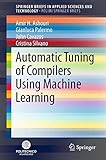Automatic Tuning of Compilers Using Machine Learning [electronic resource] / by Amir H. Ashouri, Gianluca Palermo, John Cavazos, Cristina Silvano.
By: Ashouri, Amir H [author.] .
.
Contributor(s): Palermo, Gianluca [author.] | Cavazos, John [author.]
| Cavazos, John [author.] | Silvano, Cristina [author.]
| Silvano, Cristina [author.] | SpringerLink (Online service)
| SpringerLink (Online service) .
.
Material type:  BookSeries: PoliMI SpringerBriefs: Publisher: Cham : Springer International Publishing : Imprint: Springer, 2018Edition: 1st ed. 2018.Description: XVII, 118 p. 23 illus., 6 illus. in color. online resource.Content type: text Media type: computer Carrier type: online resourceISBN: 9783319714899.Subject(s): Computational intelligence
BookSeries: PoliMI SpringerBriefs: Publisher: Cham : Springer International Publishing : Imprint: Springer, 2018Edition: 1st ed. 2018.Description: XVII, 118 p. 23 illus., 6 illus. in color. online resource.Content type: text Media type: computer Carrier type: online resourceISBN: 9783319714899.Subject(s): Computational intelligenceBackground -- DSE Approach for Compiler Passes -- Addressing the Selection Problem of Passes using ML -- Intermediate Speedup Prediction for the Phase-ordering Problem -- Full-sequence Speedup Prediction for the Phase-ordering Problem -- Concluding Remarks. .
This book explores break-through approaches to tackling and mitigating the well-known problems of compiler optimization using design space exploration and machine learning techniques. It demonstrates that not all the optimization passes are suitable for use within an optimization sequence and that, in fact, many of the available passes tend to counteract one another. After providing a comprehensive survey of currently available methodologies, including many experimental comparisons with state-of-the-art compiler frameworks, the book describes new approaches to solving the problem of selecting the best compiler optimizations and the phase-ordering problem, allowing readers to overcome the enormous complexity of choosing the right order of optimizations for each code segment in an application. As such, the book offers a valuable resource for a broad readership, including researchers interested in Computer Architecture, Electronic Design Automation and Machine Learning, as well as computer architects and compiler developers.


There are no comments for this item.